- Home
- Sarah Hall
Madame Zero Page 2
Madame Zero Read online
Page 2
The sound of a key in the front-door lock startles him. He has been lying naked on the bedroom floor while she patrols. It is Esmé, the cleaner. It is Thursday. Nine a.m. He pulls on a robe, dashes down the stairs, and catches her just as she is coming into the hallway, dropping her bag on the floor, the door gaping open behind her.
No, he shouts. No! Go away. You have to go.
He puts a hand on her shoulder and begins to manoeuvre her backwards, towards the door. She gasps in shock at such treatment. Her employer is never home when she cleans – all she knows of him is the money he leaves on the table, the addressed letters she moves from doormat to counter, and it’s his wife who speaks to her on the phone. She barely recognizes him, and for a moment mistakes him for an intruder.
What? What? Take your hands off. I, I’ll –
She is alarmed, he can see, at the blockade, at being handled by a dishevelled, undressed man. He gathers his wits, releases her arm.
Don’t clean this week, Esmé. We have a terrible bug. It’s very contagious. I don’t want to risk you getting it.
He is pale, a little crazed, but does not look ill.
Sophia has it?
Yes. She does.
Does she need anything? I can go to the pharmacy.
I’m taking care of her. Thank you. Please –
He gestures for her to leave. Routed, Esmé picks up her bag and steps away. He closes the door behind her, moves to the hall window and watches. She glances up at the bedroom, frowns, walks to her little blue car, gets in, and drives away. When he turns round the fox is standing at the top of the stairs.
Later that day, tense with anxiety, he leaves the house and goes to the library. He researches the world of madness. Folie à deux. Imposter delusion. Cotard. Capgras. Madame Zero. Mineness and the self’s relations. But is it she or he who is lost? Then: Transmogrification. Fables. If he can avail himself of understanding, reason, definition … He returns home with medical texts and a slender yellow volume from the twenties. There is little correlation to myth. He is no thwarted lover. Most upsetting is the repetition of one aspect: an act of will.
So it continues. He enters a room and at first does not notice that she is up on top of the cabinet, on the windowsill, in the sliding food rack, which he has left open. Her poise so still she is entirely missable, the way all wild things are, until the rustic outline comes into focus. The surprise of seeing her, every time, in proximity; a thing from another realm that he has brought home. She sleeps. She sleeps neatly in a circle, tail tucked under her chin. Not on the bed, where he keeps trying to put her, but on a chair seat, in the corner of the utility room. The house is warm but she makes the most of extra heat wherever she can find it – the seat he has just vacated, or under the boiler. He cleans away the black, twisted scat that he finds, almost odourless now, tries not to be disgusted. If we were old, he tells himself, if I were her carer. He leaves plates of food on the floor, milk-soaked bread, cooked chicken, inoffensive dishes, which she investigates, tries, but does not finish. Instead she looks up at him, her brows steepling, haughty, unsatisfied. Part of his brain will not translate what she wants: that she must have it raw. Her eyes flicker after birds in the garden. Even trapped behind glass, she calculates. The metrics of the hunt.
Hating the humiliation, he brings home a can of dogfood, tips the jellied lump out onto a china dinner plate. She rejects it. He finds her licking her lips and trotting out of the kitchen. On the expensive slate floor is a dark patch of saliva – she has eaten something, a spider perhaps.
He cannot speak to her anymore. She doesn’t understand and his voice sounds ridiculous to his own ears, a cacophony. She will not tolerate being in the same room for long. She roams, sniffs at the back door. She wants what’s outside, she is becoming restive, growling, but he knows he cannot let her go. What would become of her, and, with her, his hope? He inches around the front door when he leaves and locks it behind, is careful when re-entering the house. He phones and tells the cleaning woman her services are no longer needed.
And he knows; in this terrible arrangement, it is he who is not adjusting; he who is failing their relationship. So he decides. He buys uncooked meat from the butcher, offal, and in a moment of bravado, throws it onto the floor in front of her. She nips at a purple lobe, then walks away. Surely she is hungry! You are a fool, he tells himself. The next day he goes to a specialty shop and brings home a live bird. A pigeon. Its wings are clipped. He sets it on the floor, where it hops and tries to lift. Within moments she is beside it, crouching, lit with energy. He watches as she recoils and then pounces high, higher than she need, in excitement or prowess, and comes down hard on the helpless flurrying thing. She bites its iridescent neck. She twists its head. She is like machinery; the snapping and clicking of her teeth. The lavender breast is opened; there are riches inside. He turns and leaves, feeling sickened. He is angry and ashamed. That she could ever, even before this, be his pet.
It cannot go on – the proof is everywhere. Musk on the doorframes. Stains on the carpet. Downy feathers. And his unnatural longing, which can never be resolved, nor intimacy converted, even as his mind nudges against the possibility. Whatever godly or conjugal test this is, he has certainly failed. He decides. He opens the utility door and leaves it standing wide. He sits outside with his back against the cold house wall. In the garden is a muddy, mushroomy smell – tawny November. Under the trees, husks and hard fruits are furling and rotting. He waits. The pressure and temperature of the house changes, scents enter, great free gusts of coppice and bonfire and heath, and beyond, the city’s miasma. It doesn’t take long. Her head and shoulders come through the doorway. She pauses, one front paw lifted and pointing, her jaws parted, the folded tongue lifting up. He stares straight ahead. He tells himself it is not a choice. He does not want her to leave and yet he can no longer stand the lunacy, the impasse, his daily torment. Sophia has gone, he tells himself.
She bolts, a long streak of russet down the lawn, between the plum trees, and up over the fence, the white tip flashing like an afterthought.
He feels nothing. Not relief. Not sorrow. That night he leaves the back door standing open, love’s caveat. In the morning there are slugs and silvery trails on the kitchen floor, sodden leaves blown in, and the bin has been knocked over. The following night he shuts the door, though does not lock it. His dreams are anguished, involving machinery and dogs, his own brutality, and blood.
*
Winter. A little snow, which gives England an older, calmer appearance. She has not come back. He worries about the cold, what might become of her, out there. There are distant nocturnal screams, like a woman being forced – are they hers? He checks the garden for signs, prints in the crisp skin of ice, her waste. The line he tells is one of simple separation. The neighbours do not ask further questions. A letter arrives from her place of work accepting termination of employment. All the while the enormity of what has happened haunts him. The knowledge might send him insane, he thinks. One day he will take off his clothes and lie in the street and beat his head with his fists and laugh as if choking. He will admit to killing her, beg for jail, though her body will never be found.
He returns to work. He is polite and, to new workers in the office, sullen-seeming. Those who know him, those who met his wife, understand some vital spark has been extinguished. He cannot quite reclaim himself. He feels victimhood strongly. Something has been taken from him. Taken, and in the absurdest possible way. He pities himself, abhors his passivity – could he not have done more? After a while it dawns on him that she doesn’t want to come back, that perhaps she did not want what she had. An act of will. Her clothes hang in the wardrobe, until, one morning – the mornings are always easier and more decisive – he gathers them up, folds them carefully and places them in bags. He goes through the contents of her purse. They offer nothing enlightening, not even her lipstick, a red hue women can rarely wear, or the small purple ball, too gnomic to interpret. But these intimate items he
cannot throw away. He places them in a bottom drawer.
Enough, he thinks.
He tries to forget. He tries to masturbate. He thinks of others, of partial, depersonalized images, obscenities; he concentrates, but release will not come. Instead, he weeps.
*
A week later, close to Christmas, he begins to walk on the heath again. That moulted protean place, which he has for months avoided. He walks at first light, when the paths are deserted, and the low red sun glimmers between bare twigs. He is not looking. He is not looking and yet he feels keenly aware of this old, colloquial tract of land, with its debris of nature, hemmed in by roads and houses, lathed away by bulldozers. It is fecund. It is rife with a minority of life-forms. Black birds in the stark arboretum, larval-looking and half-staged in the uppermost branches. The dead grass rustling. A flash of wing or leg. Sometimes he sits for a while, his collar turned up, his gloveless hands on the fallen trunk, whose sap is hard and radiant. His breath clouds the air. He is here, now. He would give himself, except there is no contract being offered.
He might find comfort in the sinew of winter, when nothing exists but that which is already exposed, and so he does, slowly, and as the earth tilts back towards the sun, his mind begins to ease a little. To be comfortable inside one’s sadness is not valueless. This too will pass. All things tend towards transience, mutability. It is in such mindful moments, when everything is both held and released, that revelation comes.
So she appears on the path in front of him, in the budding early spring. He has been staring down at his feet as they progress, at the shivering stems and petals. All around him, the spermy smell of blossom. Yes, the world is saying, I begin. He looks up. The vixen is on a grass mound, twenty feet ahead. She is like a comet in the surroundings, her tail, her flame. She has her head lowered, as if in humility, as if in apology for her splendour, the black backs of her ears visible. Oh, her golden greening eyes. Her certainty of colour.
How easily she can fell him; and he will always fall.
She faces him. He waits to hear his name, just his name, that he could be made un-mad by it. She steps into the low scrub of the forest floor, takes a few high and tidy steps, and he thinks at first the wilderness has finally untamed her, she is afraid, about to run. But she turns, and pauses. Another step. A backward glance. What, then, is she piloting? Is he to follow?
The old, leftover stretch of heath, preserved by a tenuous council ruling, by councillors who dine in expensive restaurants with developers, has a crock of boulders and hardwoods at its centre. Moss. Thrift. Columbine. Tides of lesser vasculars. She picks her way in, a route invisible to his eye, but precisely marked, it seems. Rock to stump, she crosses and criss-crosses. She knows he is following; his footfalls are mortifying, though he tries to tread respectfully through this palace of delicate filaments. He keeps his distance. He must convey at all costs that he has no intention to touch her, take her, or otherwise destroy the accord. The roots of old trees rear out of the ground, pulling strings of soil up with them. These are earnest natives; they have survived blight and lightning and urban expansion. They bear the weight of mythical, hollow thrones. Lungs of fungi hang from their branches.
Beneath one trunk there is an opening, a gash between stones and earth. Her den. She makes a circuit of the nearby copse, then sits beside the entrance, laying her flaring tail alongside her. Her belly is pinkish and swollen. She is thinner than he remembered, her legs long and narrow-footed, like a deer’s. She cocks her head, as if giving him licence to speak. But no, he must not think this way. Nothing of the past is left, except the shadow on his mind. From her slender jaw she produces a low sound, like a chirp, a strangled bark. She repeats it. He does not know what it means. In their house she was never vocal, except with displeasure. Then, from the dark gape, a sorrel cub emerges, its paws tentative on the den-run, its eyes opaque, bluish, until only recently blind, a charcoal vulpine face. Another follows, nudging the first. And another. There are four. They stumble towards their mother. They fit to her abdomen, scrambling for position, stepping on and over each other. As she feeds them her eyes blink closed, sensually, then she stares at him.
Privy to this, no man could be ready. Not at home, skulling the delivery within the bloody sheets, nor in the theatre gown, standing behind a screen as the surgeon extracts the child. The lovely sting in him! They are, they must be, his. He crouches slowly. She is thirled to the task, but not impatient. Before they are done she nudges the cubs away. They nose against each other. They rock, vulnerably, on their paws, licking the beads of milk from each other. A great inspirational feeling lets loose in him. He has sweeping masculine thoughts. He understands his duty. He swears silent oaths to himself and to her: that he will guard this secret protectorate. That he will forgo all else. He will, if it comes to it, lie down in front of any digger before it levels this shrine.
The cubs remain above ground a moment longer. They play in silence, programmed to safe mutism, while she watches. They have her full attention. Their coats are dirty, sandy camouflage, but nothing will be left to chance. She curtails their crèche. One by one, she lifts them by their scruffs towards the hole, sends them back inside, and then, without hesitating, disappears after.
As he leaves he memorizes the way. The den is not as far from the path as he thought, dogs off their leads will detect their secretions, but it is secluded, lost behind a sward of bracken. She knows. His head is full of gold as he walks home. He allows himself the temporary glow of pride, and then relinquishes it. He has no role, except as guest. The truth is their survival is beyond his control.
He does not return every day, but once a week makes an early foray into the woods. He approaches respectfully, remains at a distance; a watcher, estranged. He never catches them out but must wait for an appearance. They materialize from the ground, from the undergrowth, an oak stump. If they know him they show no indication. Past a look or two – their eyes eerie and hazelish – they pay him no heed. Their mother has sanctioned his presence, that is all. The exclusion is gently painful, but it is enough to see them, to watch them grow.
And how rapidly they grow. The dark of their faces shrinks to two smuts either side of their noses. The orange fur begins to smoulder. Their ears become disproportionate. They are quick, ridiculously clumsy, unable to control their energy. He laughs, for the first time in months. Then their play turns savage, tumbling and biting. They learn to focus, peering at small moving quarry; they stalk, chew beetles, snap at airborne insects, while their mother lies in the grass, exhausted by them. She brings fresh carcasses, which they tug at, shaking their heads, twisting off strips of carrion. And still she feeds them her milk, though they are two thirds her size and he can see the discomfort of her being emptied, of manufacturing and lending nutrients. Sometimes she looks at him, as if waiting for his decision.
*
He is a man with two lives. He works, he holds conversations with office staff, shops at the supermarket. He turns down dates, but seems contented, and his colleagues wonder if he has, without declaration, moved on. Esmé is re-employed, though she is sad Sophia Garnett has left her husband and suspects injustice against her to be the cause – whatever that may be. But she finds no trace of any other woman in the house, no lace underwear, no lost earring or hairs gathered in the sink. The thoughts of murder pass.
He watches men lifting their children out of car seats and up from toppled bicycles. He watches them push swings. If anyone were to ask, he would say, I am not without happiness. He walks the heath. He monitors the landscape. He worries about the cubs, the multitude of dangers, even as they grow larger and stronger, and he can see all that they will be. They ambush their mother, who at times seems sallow, having sacrificed her quota of prey, having no mate to help her. They show interest in the rubbish of the woods, bringing back wrappers and foil, even the arm of a plastic doll. There will be dispersal, he knows, but not yet. For now, they are hers, and perhaps his, though peripherally.
One
day an idea strikes him. He goes to the den site. They are not there, but he doesn’t linger. He takes from his pocket the little purple ball Sophia used to keep in her purse. He places it by the entrance. The next time he comes it has vanished. He looks around until he finds it, lying under a thornbush nearby. He picks it up. There are teethmarks in the surface, scratches, signs of play.
What will become of them he does not know. The woods are temporary and the city is rapacious. He has given up looking for meaning. Why, is a useless question, an unknowable object. Who, will never be known. But to suspend thought is impossible. The mind is made perfectly of possibilities. One day, Sophia might walk through the garden, naked, her hair long and tangled, her body gloried by use. She will open the back door, which is never locked, and enter the kitchen and sit at the table. I dreamt of the forest again, she will say.
It is a forgivable romance, high conceit – he knows. At night he lies in bed, not at its centre, but closer to the midway point. He thinks of Sophia, the woman he loved. He no more expects her to return than he conceived of her departure. But he imagines her stepping across the room, bare, and damp from the shower. And then he thinks of the fox, in her blaze, in her magnificence. It is she who quarters his mind, she whose absence strikes fear into his heart. Her loss would be unendurable. To watch her run into the edgelands, breasting the ferns and scorching the fields, to see her disappear into the void – no – how could life mean anything without his unbelonging wife?

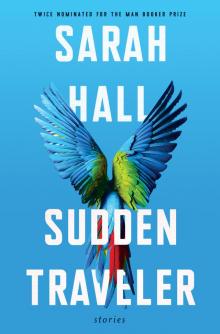 Sudden Traveler
Sudden Traveler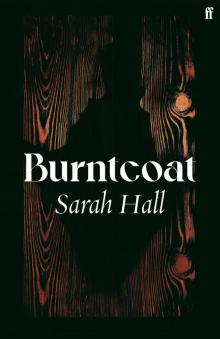 Burntcoat
Burntcoat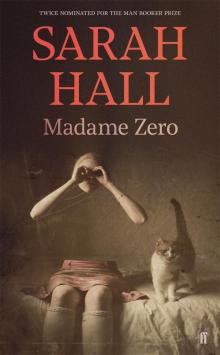 Madame Zero
Madame Zero Mrs Fox
Mrs Fox Sex and Death
Sex and Death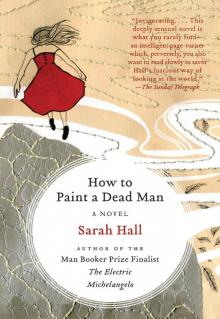 How to Paint a Dead Man
How to Paint a Dead Man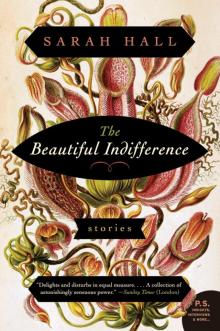 The Beautiful Indifference
The Beautiful Indifference The Wolf Border
The Wolf Border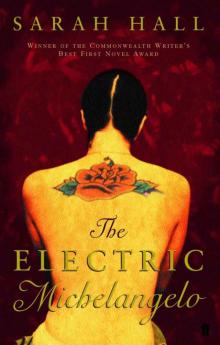 The Electric Michelangelo
The Electric Michelangelo